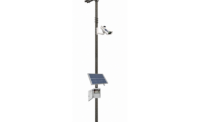As the demand grows for better data access on jobsites and the Internet of Things begins to bleed over into construction equipment, tool manufacturers are working to build wireless connectivity into their product lines. New offerings for Bluetooth tracking of tools and the commercial launch of a wireless mesh for jobsites are two directions that tool manufacturer DEWALT is pursuing.
"The industry is in the midst of a digital revolution," says Tony Nicolaidis, DEWALT vice president. "All our users are working increasingly with digital documents [and] all their plans are going into the cloud, but when you get on a site, the connectivity solution to get to your data may be nonexistent or very unreliable."
The need for the latest digital documents is one of the main use cases DEWALT sees for its new WiFi access point, due out later this year. The wall-mounted or tripod-mounted unit is able to broadcast a WiFi signal over 10,000 sq ft of a jobsite and can easily mesh with other access points to blanket a large jobsite in wireless connectivity.
The units are meant to replace the ad hoc or nonexistent wireless access on large jobsites. "We built this to the same level of standards as our tools," says Kelly Musselwhite, vice president of sales for DEWALT's connected-systems unit. "It really had to be jobsite-tough and be simple to deploy and manage." The WiFi access point has an IP67 rating for dust- and waterproofing and can survive a 10-ft drop. Each unit requires corded AC power to run, but DEWALT representatives say the company is working on battery-based solutions for future models.
The DEWALT wireless access point was still in its prototype stage when featured in ENR earlier this year. In the months since, the manufacturer has settled on a few key details. There is only one model of the wireless access point, and any of THEM can serve as the base station, connected to the wired internet connection. Like other wireless mesh networks, each device serves as a node that works with other nodes to maintain connectivity, even if one goes offline or has to be relocated.
"As things happen on a jobsite—concrete being poured or material being moved—we don't want the user to have to go out and recalibrate the system every few days," says Musselwhite. "This system can adapt to changes in the environment, and the mesh network can self-heal if it sees a unit go down." The WiFi access points have an MSRP of $1,499.99 apiece and will be available through DEWALT distributors.
Getting access to project documents anywhere on the site isn't the only part of the wireless jobsite DEWALT is chasing. Two years ago, the company introduced Bluetooth tracking for some of its power tools, allowing for basic awareness of tool locations based on what users' smartphones have passively logged. Now, users' tools can be found using the Bluetooth monitoring of every phone with DEWALT's app installed, passively recording the locations of tools and uploading them to DEWALT's service. This crowd-sourced tool tracking is similar to a feature in the app offered by DEWALT's competitor Milwaukee Tool. According to DEWALT, the accuracy of these "last known location" notifications will only improve as more users install the app.
The system has since been expanded to include battery-powered tags that can be added to anything worth tracking, and DEWALT has introduced a connector that adds Bluetooth tracking to any of its 20V power tools. Both the connector and the tags run on coin-cell batteries, with an expected life of three years.
"This is just the beginning. Our tool-connect platform will evolve into a construction [Internet of Things] platform over time," says Nicolaidis. "Expect to see more productivity solutions from us over time."
"It's the jobsite of the future," says Frank Mannarino, DEWALT president for power tools and equipment. "We believe if we do this correctly, we will unlock productivity potential unlike what we've seen before in construction."






Post a comment to this article
Report Abusive Comment